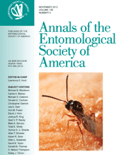
ANNALS OF THE ENTOMOLOGICAL SOCIETY OF AMERICA
Scope & Guideline
Unveiling Nature's Secrets Through Entomology
Introduction
Aims and Scopes
- Insect Behavior and Ecology:
The journal focuses on the behavioral patterns and ecological roles of insects, exploring how these factors influence their interactions within ecosystems. This includes studies on mating behaviors, foraging strategies, and the impact of environmental changes on insect populations. - Insect-Plant Interactions:
Research on the complex relationships between insects and plants is a core area, including topics such as pollination, herbivory, and host plant selection. These studies are crucial for understanding ecosystem dynamics and agricultural practices. - Pest Management and Biological Control:
The journal highlights research aimed at developing sustainable pest management strategies, including the use of biological control agents and integrated pest management techniques. This focus addresses the challenges posed by invasive species and pest resistance. - Genetics and Molecular Biology:
There is a strong emphasis on genetic studies, including the application of molecular techniques such as CRISPR/Cas9 for pest control and understanding genetic diversity within insect populations. This area contributes to the advancement of biotechnological applications in entomology. - Conservation and Biodiversity:
Research on conservation strategies and the biodiversity of insect species is integral to the journal's scope, reflecting the need to understand and mitigate the effects of habitat loss and climate change on insect populations.
Trending and Emerging
- Citizen Science and Community Engagement:
There is a growing trend towards involving community scientists in entomological research, exemplified by studies comparing community-driven data collection methods. This reflects a broader movement to engage the public in scientific research and conservation efforts. - Climate Change Impact on Insects:
Research addressing the effects of climate change on insect populations and their ecological roles has gained prominence, highlighting the urgency of understanding how changing climates affect biodiversity and pest dynamics. - Technological Innovations in Entomology:
The use of advanced technologies, such as CRISPR for genetic manipulation and digital tools for monitoring insect populations, is on the rise. This trend underscores the integration of cutting-edge methodologies in entomological research. - Interdisciplinary Research Approaches:
There is an increasing emphasis on interdisciplinary studies that combine entomology with fields like ecology, genetics, and environmental science, indicating a holistic understanding of insect roles in ecosystems. - Pollinator Health and Conservation:
A surge in research focused on pollinator health, including the impacts of agricultural practices on pollinator populations, reflects growing awareness of their critical role in ecosystems and food production.
Declining or Waning
- Traditional Taxonomy:
There has been a noticeable decrease in papers focused solely on traditional taxonomic studies. As molecular techniques advance, researchers may be prioritizing genetic and phylogenetic approaches over morphological descriptions. - Insect Pathology:
Research specifically centered on insect pathology has waned, possibly due to a greater emphasis on integrated pest management and ecological interactions rather than solely focusing on diseases affecting insects. - Insect Physiology:
Although still relevant, studies focusing exclusively on insect physiology have decreased, as research increasingly integrates physiological aspects within broader ecological and behavioral contexts.
Similar Journals
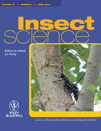
Insect Science
Elevating the impact of insect science on global ecosystems.Insect Science, published by WILEY, stands as a prestigious journal in the realms of Agronomy, Biochemistry, Genetics, and Insect Ecology. The journal, with ISSN 1672-9609 and E-ISSN 1744-7917, has firmly established itself as a significant resource for researchers and professionals seeking to explore the intricate dynamics of insects and their crucial roles in ecosystems. With a remarkable impact factor placing it in the Q1 quartile across multiple categories, including Ecology and Evolution and Agronomy and Crop Science, Insect Science ranks impressively at #8 out of 181 in the realm of Insect Science on Scopus, showcasing its influence and relevance in the field. Spanning its coverage from 1994 to 2024, this journal invites contributions that advance our understanding of insect biology, behavior, and their interactions within agricultural contexts. The commitment to high-quality research and its role in fostering interdisciplinary dialogue make Insect Science an essential platform for scholars and practitioners at the forefront of insect-related studies.

REVISTA DE LA SOCIEDAD ENTOMOLOGICA ARGENTINA
Bridging Disciplines in the World of InsectsREVISTA DE LA SOCIEDAD ENTOMOLOGICA ARGENTINA is an esteemed open-access journal dedicated to the field of entomology, published by the SOCIEDAD ENTOMOLOGICA ARGENTINA. Since its transition to open access in 2013, the journal has sought to promote research in insect science, ecology, and related disciplines, facilitating global dissemination of knowledge and encouraging collaborative studies across borders. Located in the vibrant scientific landscape of La Plata, Argentina, the journal is indexed in Scopus and categorized in the fourth quartile of ecology and insect science, reflecting its commitment to enhancing the discourse within these critical fields. Aiming to bridge the gap between researchers, students, and professionals, REVISTA DE LA SOCIEDAD ENTOMOLOGICA ARGENTINA serves as a platform for innovative research, reviews, and reports on ecological interactions, behavior, and systematic entomology, ultimately driving forward our understanding of insect biodiversity and its broader environmental impacts.

REVISTA COLOMBIANA DE ENTOMOLOGIA
Unraveling Insect Mysteries for a Sustainable FutureREVISTA COLOMBIANA DE ENTOMOLOGIA, published by the SOC COLOMBIANA ENTOMOLOGIA-SOCOLEN, serves as a vital platform for disseminating research in the field of insect science. With an ISSN of 0120-0488, the journal has established itself as a key resource for entomologists, agricultural scientists, and biodiversity researchers, focusing on the ecology, taxonomy, and behavior of insects within the Colombian context and beyond. Despite its Q4 ranking in 2023, REVISTA COLOMBIANA DE ENTOMOLOGIA strives to enhance its impact within the academic community, offering a space for innovative studies and reviews that aim to advance the understanding of insect-related phenomena. As a publication addressing critical concerns in agricultural and biological sciences, it invites contributions that explore new methodologies and findings relevant to the insect world. Although it does not currently offer Open Access options, the journal's growth from 2004 to 2024 reflects its commitment to evolving with the needs of its readership and contributors, making it an essential reference point for students and professionals alike interested in entomological research.
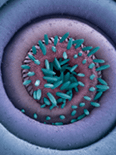
Annual Review of Entomology
Unraveling the Mysteries of Insect BehaviorAnnual Review of Entomology, published by Annual Reviews, is a premier journal dedicated to advancing the understanding of entomology through comprehensive review articles from leaders in the field. With a focus on Ecology, Evolution, Behavior, and Systematics and Insect Science, the journal ranks in the top quartile (Q1) as of 2023, reflecting its significant impact and relevance in these disciplines. Based in the United States, the Annual Review of Entomology has been a trusted resource since its inception, providing critical insights that inform research, policy, and education in entomology. Researchers and professionals will find valuable reviews that synthesize current knowledge and highlight future directions in insect research. The journal's impressive standing, as indicated by its rankings—first in both Agricultural and Biological Sciences categories—emphasizes its pivotal role in shaping scientific discourse and innovation.
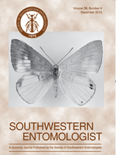
SOUTHWESTERN ENTOMOLOGIST
Connecting Researchers to Tackle Ecological ChallengesSOUTHWESTERN ENTOMOLOGIST is a pivotal academic journal dedicated to advancing the fields of Agronomy, Ecology, and Insect Science. Published by the SOUTHWESTERN ENTOMOLOGICAL SOC in the United States, this journal plays a crucial role in disseminating vital research findings that address pressing ecological and agricultural challenges. With its ISSN 0147-1724 and E-ISSN 2162-2647, the journal has been publishing comprehensive studies since 1993 and continues to contribute significantly to the knowledge base up to 2024. As a Q4 ranked journal in both Agronomy and Crop Science and Ecology, as well as Insect Science, it provides an inclusive platform for researchers and students to share their insights and foster collaborations. Although it currently does not offer open access options, the content is accessible to academic institutions and professionals, ensuring that significant findings reach a broad audience. Given its niche focus, SOUTHWESTERN ENTOMOLOGIST not only appeals to researchers and students but also to professionals looking to stay updated on the latest trends and developments in entomology and its related fields.
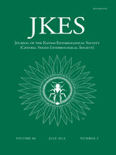
JOURNAL OF THE KANSAS ENTOMOLOGICAL SOCIETY
Bridging Research and Agricultural ImpactJOURNAL OF THE KANSAS ENTOMOLOGICAL SOCIETY, published by the Kansas Entomological Society, serves as a vital platform dedicated to the field of entomology and insect science. With an ISSN of 0022-8567 and an E-ISSN of 1937-2353, this journal has established itself since its inception in 1994, continuing to contribute valuable research up to 2024. Despite its current Q4 categorization in the 2023 Insect Science rankings, it ranks 106 out of 181 in Scopus, representing a significant opportunity for researchers to disseminate their findings in a supportive and engaged community. Although it is not an open-access journal, its commitment to rigorous peer review and relevance in agricultural and biological sciences makes it an essential resource for professionals, scholars, and students alike. The journal's focus on local and regional entomological issues often addresses broader ecological impacts, showcasing the importance of insects in environmental health and agriculture. We invite you to explore the rich tapestry of findings and discussions within this esteemed publication.
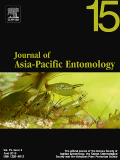
JOURNAL OF ASIA-PACIFIC ENTOMOLOGY
Navigating the Diverse Landscape of Insect ScienceJOURNAL OF ASIA-PACIFIC ENTOMOLOGY, published by the Korean Society of Applied Entomology, is a distinguished platform that fosters the advancement of knowledge in the field of entomology, specifically tailored to the Asia-Pacific region. Since its inception in 1998, this journal has been instrumental in providing critical insights into the diverse aspects of insect science, reflecting its commitment to supporting both research and application in a variety of contexts, including agriculture and environmental sustainability. The journal is categorized in the Q3 quartile for Insect Science according to the 2023 rankings, and it holds a respectable Scopus rank of #62 out of 181 in its niche, situating it within the top 66th percentile of its field. With a focus on peer-reviewed research that emphasizes innovation and practical applications, the journal serves as an essential resource for researchers, professionals, and students seeking to deepen their understanding of entomological studies and their implications across ecological and agricultural landscapes.
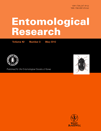
ENTOMOLOGICAL RESEARCH
Innovating Pest Management Strategies through ResearchENTOMOLOGICAL RESEARCH, published by Wiley, is a prominent journal within the field of Insect Science, with a significant focus on advancing our understanding of entomological studies, including pest management, biodiversity, and ecological impacts of insects. Since its inception in 2007, the journal has served as a vital platform for researchers and practitioners to publish high-quality, peer-reviewed articles that contribute to the growing body of knowledge in this essential discipline. With an H-index illustrating its citation impact and its classification in the 2023 Scopus quartile rankings at Q3, ENTOMOLOGICAL RESEARCH ranks 69 out of 181 journals in its field, positioning itself within the 62nd percentile, which underscores its relevance and contribution to agricultural and biological sciences. Although it does not offer Open Access, the journal remains committed to ensuring that its content reaches the widest possible audience, supporting ongoing discoveries and innovations in insect science. For researchers, professionals, and students seeking to remain at the forefront of entomological advancements, ENTOMOLOGICAL RESEARCH is an indispensable resource.

Insects is a prominent open-access journal published by MDPI, dedicated to advancing research in the vibrant field of insect science. Since its inception in 2011, this journal has become a vital resource for academics and professionals alike, also ranked in the prestigious Q1 category within the Insect Science field by Scopus, achieving a remarkable rank of 26 out of 181 journals. With an ongoing convergence period from 2010 to 2024, Insects provides comprehensive coverage of various aspects of entomology, including but not limited to ecology, behavior, physiology, and applied entomology. Based in Switzerland, the journal promotes an open-access model, ensuring that vital research is readily available to researchers, practitioners, and students globally. This journal not only facilitates the dissemination of groundbreaking entomological research but also fosters collaboration and interdisciplinary dialogue in the field.
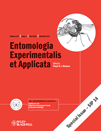
ENTOMOLOGIA EXPERIMENTALIS ET APPLICATA
Pioneering research for a deeper understanding of insects.ENTOMOLOGIA EXPERIMENTALIS ET APPLICATA is a premier journal dedicated to advancing the understanding of insect science through innovative research and thorough experimental methodologies. Published by Wiley, this esteemed journal has been at the forefront of entomology since its inception in 1958, with its latest convergence extending until 2024. With a commendable Impact Factor and categorically positioned in the Q2 quartile across both Ecology, Evolution, Behavior and Systematics and Insect Science fields, it plays a pivotal role in the dissemination of critical findings. The journal is indexed in Scopus, ranking 43rd out of 181 in Insect Science, showcasing its relevance and stature within the academic community, while maintaining a robust visibility among scholars. Given its rigorous peer-review process and a commitment to quality and innovation, ENTOMOLOGIA EXPERIMENTALIS ET APPLICATA serves as a vital resource for researchers, professionals, and students aiming to deepen their insights into entomological research.